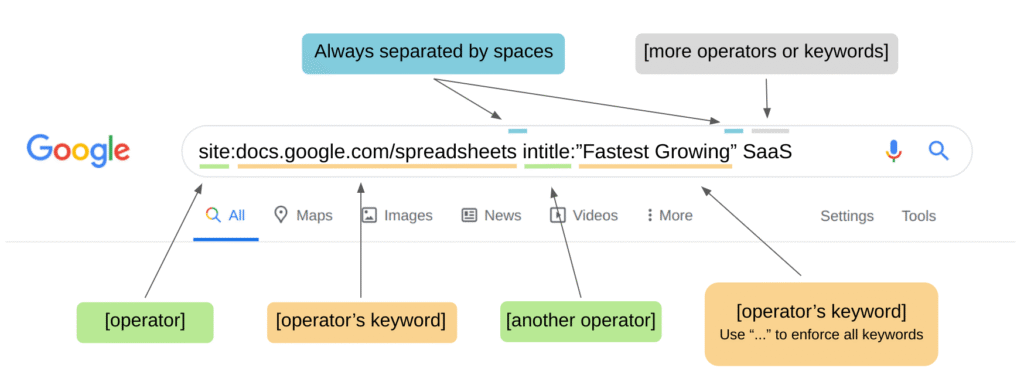Most people use Google daily, but very few know how to unlock its full potential. Whether you’re a blogger, SEO professional, or content creator, understanding Google Search Operators can transform how you search the web. These powerful commands let you refine searches, discover hidden content, spy on competitors, and ultimately boost your SEO rankings.
In this complete guide, we’ll walk you through the Google Search Operators list, real-world examples, advanced techniques, and use cases tailored specifically for bloggers and SEOs. Consider this your Google Search Operators cheat sheet for 2025 — a must-have for anyone who wants to do SEO step-by-step and find content opportunities faster and smarter.

By the end of this article, you’ll understand how to use search operators to:
- Conduct advanced Google searches for academic or eCommerce use
- Improve keyword research
- Analyze competitors’ SEO strategies
- Discover guest posting and backlinking opportunities
- Write SEO-optimized blog content
What Are Google Search Operators?

Google Search Operators are special characters or commands that help you filter and manipulate search results more precisely. By using these operators, you can bypass irrelevant pages, hone in on specific file types, locate keywords in certain places like titles or URLs, and much more.
Think of it as advanced Google search—where instead of just typing what you want, you use logic and precision to get exactly what you need.
For example, let’s say you’re looking for SEO tools, but you want PDF guides only. Instead of just searching “SEO tools,” you can search:
"SEO tools" filetype:pdfGoogle will show only PDF documents containing that phrase. That’s the power of search operators.
Another example: If you’re a blogger trying to analyze the top-ranking guides on SEO tools, try:
intitle:"seo tools guide" site:medium.comNow, you’ll see only Medium blog posts that include “SEO tools guide” in the title.
Why Should You Use Google Search Operators?
Here’s how using Google Search Operators can make your SEO work and blogging strategy more effective:
- ✅ Find low-competition content ideas fast
- ✅ Spy on competitors’ websites and content structure
- ✅ Identify backlink opportunities with resource and guest post pages
- ✅ Boost SEO rankings by discovering what’s working in your niche
- ✅ Filter irrelevant search results and save time in research
- ✅ Discover hidden PDFs, Excel sheets, and documents for content support
Imagine you’re writing a blog on “AI tools for productivity.” You can use operators like intitle:"AI tools" to find only articles that mention your topic in their title, giving you a better idea of what’s trending and where you can offer something new.
Whether you’re figuring out how to do SEO for your website step-by-step, or trying to find content gaps in your niche, these tools are incredibly useful.
Using Google search operators strategically can also help:
- Ecommerce stores improve product keyword targeting
- SEO freelancers pitch clients with competitor insights
- Agencies identify under-optimized content gaps
- Students conduct advanced research
Essential Google Search Operators List (With Examples)
Basic Search Operators
| Operator | Function | Example |
|---|---|---|
"keyword" | Exact match | "best AI tools for SEO" |
-keyword | Exclude term | AI tools -chatgpt |
OR | Either term | seo checklist OR seo audit |
* | Wildcard (acts as a placeholder) | "best * for blogging" |
Example: If you’re searching for content either about SEO checklists or SEO audits, use:
seo checklist OR seo auditThis tells Google to pull results with either term.
Content-Focused Operators
| Operator | Function | Example |
intitle: | Finds pages with term in title | intitle:"SEO tips" |
intext: | Finds pages with term in content body | intext:"keyword density" |
inurl: | Finds pages with term in URL | inurl:seo-guide |
allintitle: | All terms in title | allintitle:seo beginner guide |
allinurl: | All terms in URL | allinurl:seo tips blog |
Example:
intitle:"how to start a blog"This will find articles where “how to start a blog” appears in the title—perfect for analyzing top-performing headlines.
Domain & Site-Specific Operators
| Operator | Function | Example |
site: | Searches only a specific domain | site:chaotechh.com |
related: | Finds similar websites | related:moz.com |
cache: | Shows Google’s cached version | cache:chaotechh.com/tools |
Example: To explore what your competitor is publishing on their blog:
site:example.com inurl:blogFile-Type Specific Operators
| Operator | Function | Example |
filetype: | Filters results by file type | filetype:pdf seo audit |
define: | Shows definition of a term | define:semantic search |
Example:
filetype:xls keyword plannerThis will return downloadable spreadsheets related to keyword planning.
These Google advanced search operators help you drill down and uncover information most users never find.
Real-World Use Cases for SEO & Blogging

1. Find Content Ideas
Finding new blog topics can be hard, especially in saturated niches. Try using:
intitle:"how to" site:reddit.comThis operator combination pulls user-generated questions from Reddit with titles that start with “how to”. These are high-intent topics — ideal for blog inspiration.
Want to focus just on blogs?
inurl:blog intitle:"productivity tools"Now you’re filtering Google results only from URLs that include ‘blog’ and titles that mention ‘productivity tools’.
This helps you:
- Avoid duplicate topics
- Identify trending ideas
- Write with intent
2. Competitor Research
Want to reverse-engineer your competitor’s content strategy?
site:competitor.com inurl:blogYou’ll instantly see their blog archive indexed by Google. Add intitle:guide or intitle:case study to filter for long-form content.
This helps you:
- Discover their most SEO-focused posts
- Benchmark your content length and structure
- Create a better, updated version (Skyscraper technique)
3. Find Guest Posting Opportunities
Guest posting still works for SEO, if done correctly. To find blogs accepting submissions:
intitle:"write for us" + your keywordYou can also try:
inurl:guest-post marketing toolsPro tip: Filter further with filetype:pdf to find media kits or guidelines.
4. Backlink Research
Want to build links? Look for resource pages:
intitle:"resources" + keywordExample:
intitle:"resources" "email marketing"Reach out to these sites and suggest your blog or free tool as an addition.
5. Ecommerce Keyword Hunting
If you’re into product reviews or affiliate marketing:
site:amazon.com intitle:"gaming laptop"This reveals keyword-rich product pages that you can target in your blog titles.
6. Academic Research & Stats
When writing data-backed blogs, you need credible sources:
filetype:pdf site:.edu "climate change impact"This gives you academic PDFs on your chosen topic.
Or:
filetype:xls "social media statistics"Perfect for finding raw data in spreadsheets.
7. Job Hunting or Freelance SEO Clients
site:linkedin.com/in "seo specialist" "open to work"You can even build a lead pipeline by targeting those with relevant titles.
Bonus Section: Combine Operators Like a Pro
You’re not limited to one operator per search. Combining them can yield powerful results.
Example:
site:forbes.com inurl:blog intitle:"AI tools" filetype:pdfThis query searches for blog posts on Forbes that mention AI tools in the title and are available as PDFs (if any exist). While niche, it shows the level of depth you can reach.
Pro Tips to Use Google Operators Effectively
- ✅ Use double quotes (
"") to target exact match phrases - ✅ Mix and match multiple operators for compound queries
- ✅ Bookmark frequent search patterns for repeat use
- ✅ Use
cache:to diagnose recent changes on pages - ✅ Combine
site:withinurl:orintitle:for hyper-targeted searches
Common Mistakes to Avoid
- ❌ Overcomplicating queries with too many stacked operators
- ❌ Ignoring the intent behind results
- ❌ Forgetting to localize searches (e.g., adding site:.in for Indian websites)
- ❌ Assuming search operators replace SEO tools — they complement them
Google Search Operators vs SEO Tools
Google operators are free and powerful, but they aren’t a complete replacement for tools like Semrush, Ahrefs, or Ubersuggest. Here’s when to use each:
| Use Operators When You… | Use SEO Tools When You… |
| Want quick insights or links | Need keyword volume & CPC data |
| Are doing quick competitor checks | Need backlink audits or rank tracking |
| Are creating content manually | Scaling large SEO campaigns |
Use Google search operators to enhance your on-the-fly research, then validate those ideas with keyword tools.
Using both together gives you the best of both worlds.
10 Ready-Made Google Search Queries You Can Use Today
intitle:"seo checklist" filetype:pdf
site:quora.com "best seo tips"
inurl:resources "keyword research"
intitle:"write for us" blogging
filetype:pdf site:.edu AI tools
site:medium.com intext:"content strategy"
cache:yourcompetitor.com
related:hubspot.com
intitle:"case study" SEO
site:linkedin.com/in "seo expert"
These demonstrate how to uncover hidden content, track competitors, and discover SEO-friendly opportunities. Try them out and see how quickly your content discovery improves.
Conclusion
Google Search Operators are an underused but incredibly powerful tool for SEO professionals, bloggers, researchers, and digital marketers. Whether you’re trying to boost SEO rankings, find content ideas, or conduct advanced competitive research, this Google search operators cheat sheet equips you with everything you need.
Start experimenting with these today, bookmark this guide, and use it whenever you need an edge in your content strategy.
FAQ: Google Search Operators for SEO & Blogging
What are Google Search Operators?
Google Search Operators are advanced commands you can use in Google Search to refine and filter results. They help you find specific content, such as pages with a keyword in the title (intitle:), in the URL (inurl:), or even on a particular website (site:).
How do Google Search Operators help boost SEO rankings?
They help discover content gaps, spy on competitors, identify guest post opportunities, and find backlink sources. This makes your content strategy sharper and more targeted — all of which contribute to better SEO performance.
Is there a complete Google Search Operators list?
Yes! Our article provides a full list of essential and advanced Google Search Operators. This acts as a Google Search Operators cheat sheet to reference anytime you’re doing research.
How can I use search operators to find guest post sites?
Use search queries like intitle:"write for us" + [your keyword] or inurl:guest-post + [topic] to find blogs and websites that accept contributions.
Can beginners use advanced Google search operators?
Absolutely. Even though they sound technical, operators like intitle: and site: are easy to learn. This guide shows how to do SEO for your website step-by-step, starting with Google itself.
What are some examples of Google Search Operators in real use?
You can use:
intitle:"seo tools" site:medium.comto find blogsfiletype:pdf site:.edu marketingto find academic resourcesinurl:resources "email outreach"to find link building targets
Are there hidden or lesser-known Google Search Operators?
Yes, operators like AROUND(X), define:, and advanced combinations are lesser known but highly effective. These hidden gems can help you dig deeper into search results.
How can I use Google Search Operators for keyword research?
Use operators like intitle:"how to" [keyword], inurl:seo-guide, and site:reddit.com to identify trending questions and long-tail keywords — great for blog titles and SEO.
